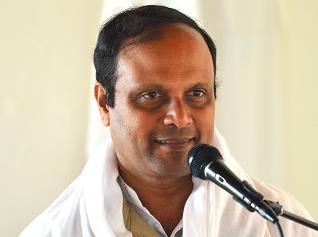“Did today’s guided meditation session make your mind happy and peaceful?” I asked this question to Chan Oi Wan, an undergraduate student who was enrolled in a minor course offered by the Centre of Buddhist Studies (CBS) of the University of Hong Kong (HKU). The course was called Buddhist Psychology and Mental Cultivation. 200 undergraduate students from different faculties enrolled in this ongoing course, in which I was a teaching assistant.
“It was an intensive experience that I have earned from meditation teacher Upul Nishantha Gamage,” Wan told me. He said that Upul’s talk on metta bhavana (loving-kindness meditation) was so “heartwarming when he said that this meditation helps us to increase the capacity for forgiveness, and forging strong connections to others regardless of who the Other is.”
Upul teaches at Nilambe Buddhist Meditation Centre in Nilambe, Sri Lanka. He also conducts workshops and meditation retreats in hospitals, prisons, schools, monasteries, and private residences. He frequently travels to conduct meditation retreats in Europe and other parts of Asia, including Hong Kong. During Upul’s last trip to Hong Kong in October, Dr. G.A. Somaratne of CBS invited Upul to conduct a guided meditation session in Dr. Somaratne’s class on 6 November.
Upul was initially invited to Hong Kong by Wherevergreen, a non-profit online platform which allows people to explore, share, and co-create information, locations, and stories relating to green living in the community. He conducted a five-day meditation retreat, a Wherevergreen-affiliated one-day retreat, and gave a talk on: “Getting Closer to the Nature and Yourself.”
Upul conducted two sessions of meditation for undergraduate students in Dr. Somaratne’s class. The first session was on mindfulness and breathing for shorter periods. Upul asked us to close our eyes, sit comfortably, relax our whole body, and keep our eyes closed throughout the session and bring our awareness inward. We practiced breathing meditation on the natural breath, its incoming and outgoing at the entrance of our nostrils without trying to change the flow.
Though this meditation was relatively short, this technique liberated our mind from problems such as anxiety, anger, and laziness for the time being. Upul said through regular practice of this meditation, we can enhance our concentration and memory and cultivate self-confidence, higher productivity, and greater efficiency.
The instruction on loving-kindness meditation was profound. In the second session, Upul asked us to close our eyes and sit comfortably like in the first session. He guided us on meditateing on loving-kindness by sending our love and warm wishes to fellow meditators in the class, then students on campus, then all people in Hong Kong, and finally all sentient beings in the world by wishing silently: “May you be free from all dangers, may you be free from all unsatisfactoriness, may you live peacefully!”
He taught that the essence of loving-kindness meditation is to focus warm-hearted, loving energy in oneself, then channel it inward for oneself and radiate it outward towards others. Upul concluded the session by remarking that the practice of meditation allows us to help, understand, and chage ourselves for the better (as we are becoming more and more busy and stressful in our daily lives). It is worth noting that Upul’s great ability to speak to our hearts in both a practical and philosophical way was enormously powerful. It spurred us on to practice meditation in a warm-hearted manner by sending kindness, goodwill towards others by silently practicing loving-kindness meditation.

